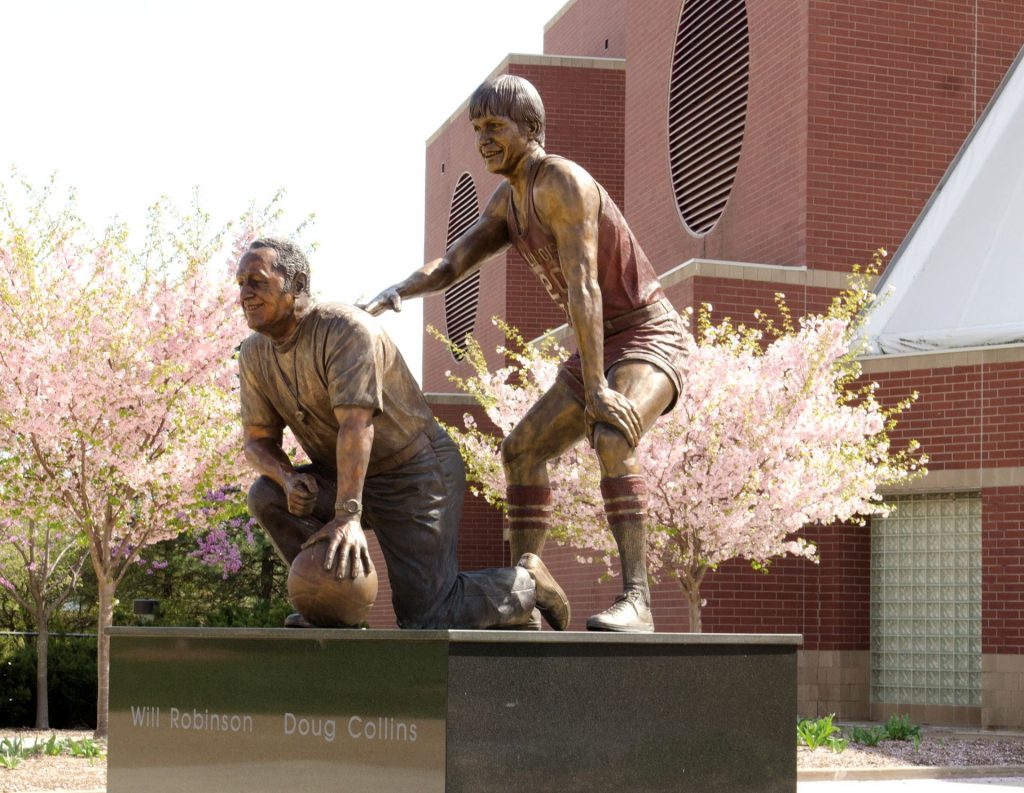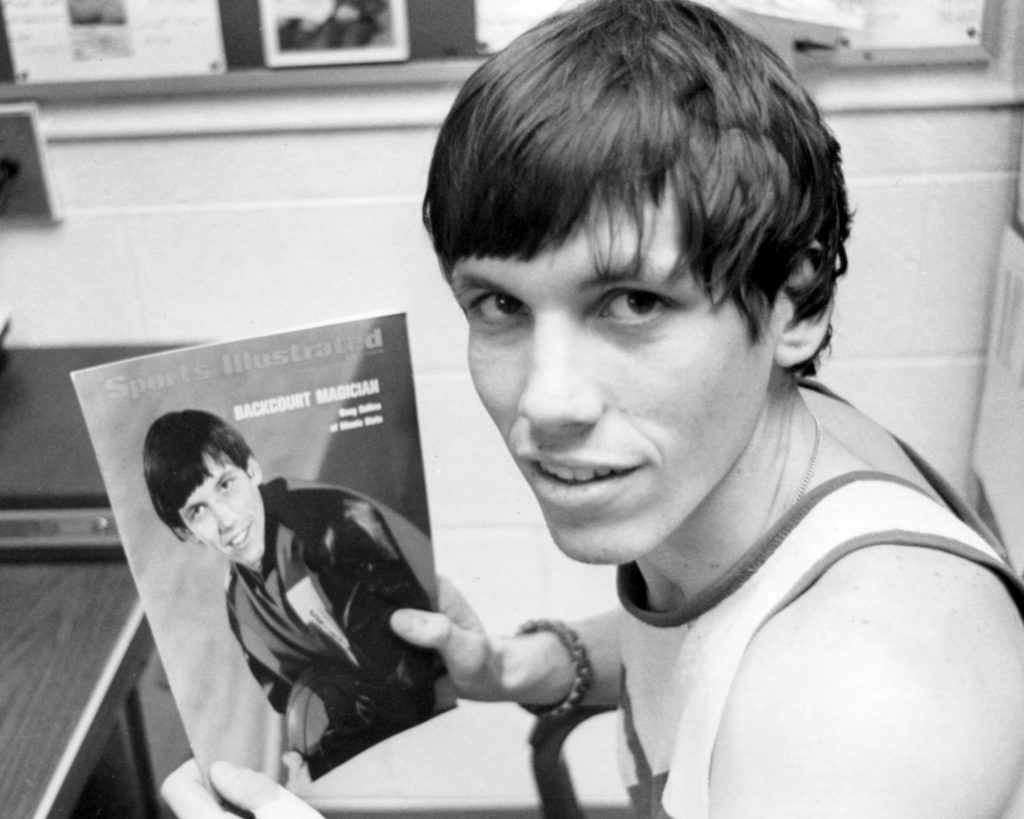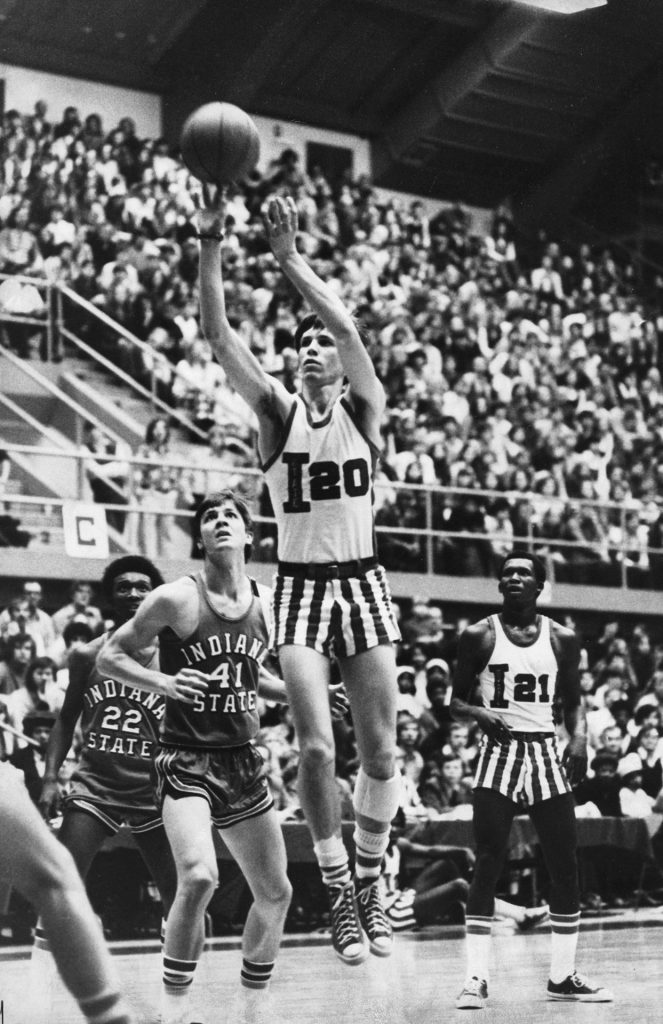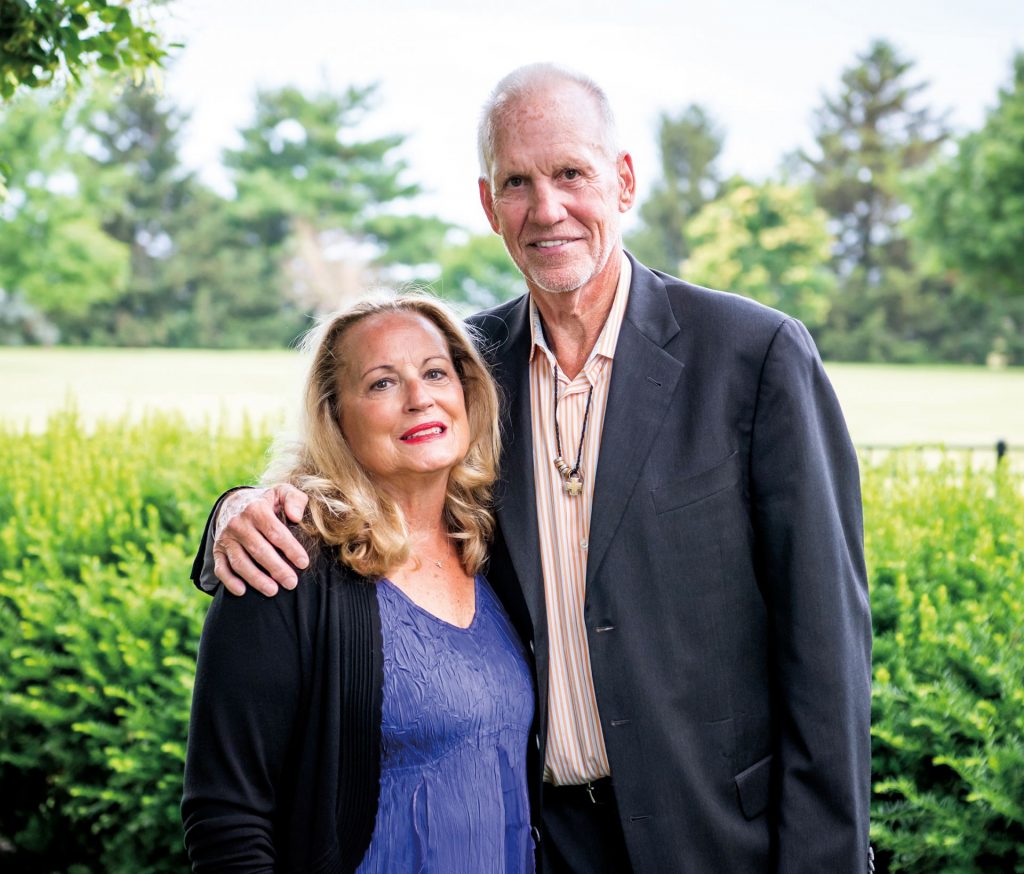
The script was there. The last pages were in Doug Collins’ hands.
In the spring of 1972, following a standout junior year for the Illinois State men’s basketball team when he averaged 32.6 points per contest, Collins’ home-state professional team came knocking. The Chicago Bulls made it clear they were planning to draft Collins and offer him a four-year contract.
The electrifying 6-foot-6 guard from small-town Benton seemed destined to be the Bulls’ heir apparent to Jerry Sloan, an eventual Hall of Famer also from downstate Illinois whom Collins idolized.
Needing to mull over such a life decision, Collins drove to Florida with good friend Don Franke ’71 during the spring break holiday. The journey to the Sunshine State provided clarity. While it could have been fairy tale-like to replace his sports idol while staying close to home, Collins decided his story at Illinois State needed completion. In addition to on-court goals, including making the 1972 U.S. Olympic roster in Munich, he wanted to finish his degree.
So Collins, one of the top college players and pro prospects in the entire country, returned for his senior year and graduated in 1973. He’s eternally grateful for that decision.
In recent years, college basketball has become more springboard than landing spot for the nation’s most sought-after draft picks. Players are eligible for the professional game at age 19, meaning they can leave school after their freshman season. With recently relaxed transfer rules, players are switching schools at a rapid rate to maximize their exposure.

With name, image, and likeness battles going all the way to the Supreme Court, some top basketball prospects have elected to forgo college altogether and play in Europe or enter the NBA’s developmental league before their draft eligibility.
Collins didn’t have those options but he knows for certain that had he left early, he wouldn’t be Illinois State’s all-time leading scorer at 2,240 career points. He wouldn’t have represented his country at the Olympic Games in Munich, as going pro would have forfeited his required amateur status for the world stage.
The court at Redbird Arena may not bear his name, and there might not be a statue outside that same venue that he shares with his coach, Will Robinson, who became the first Black man to lead a Division I program. He also would have forgone a year at a place that is so near and dear to him to this day.
Collins wouldn’t write his life story any other way, and he hopes players today realize the journey is not a race.
“I always tell people, don’t be in a hurry,” Collins said. “Make sure you are prepared. You don’t get dropped onto a mountain. You climb it. And in that climb, you become more prepared to be able to meet the challenges of that.”
It helped that he enjoyed the view so much at Illinois State on his way to basketball’s highest summit, as the Philadelphia 76ers selected Collins with the first overall pick a year later in 1973.
Back on campus in June, Collins still basks in the memories made at ISU while earning a physical education degree. He returned to be honored as a Lincoln Laureate, the highest honor given in Illinois for professional achievement and public service. The accolade is one of many for Collins, who is a Distinguished Alum inducted into ISU’s Percy Family Athletics Hall of Fame and the College Basketball Hall of Fame.

While on campus, Collins took his grandkids by Wilkins Hall, where room 1016 was his first home away from home. Every spot on campus, he said, has a story special to him. He remembers the snowy walks on his way to McCormick Hall for anatomy and physiology courses. He met his wife, 1973 College of Education grad Kathy (Stieger), at the University.
“Every time I come back on campus, I get an energy about me, because everything that’s happened to me at Illinois State has been great,” said Collins, whose connection to the University is made even sweeter by his decision to stay. “When I was here, I couldn’t wait to wake up the next day because I just felt myself growing as a person.”
His on-court prowess earned him unrivaled stardom at the University and beyond. After his heroics in the Olympics—where he would have had the game-winning free throws in the gold medal game against the Soviet Union had it not been for a famously controversial ending—Sports Illustrated put him on the cover while dubbing him “The Backcourt Magician.”
Fans flocked to Horton Field House to see him play. As a senior, he became the first and only first-team All-American player at Illinois State, scoring 26.9 points per game and becoming the focal point of every team’s scouting report.
“Every time I come back on campus, I get an energy about me, because everything that’s happened to me at Illinois State has been great.”
Doug Collins
But he’s equally proud of being a first-team academic All-American that season, taking his studies as seriously as his scoring. “My message to young people is that you can do both,” he said.
Being well-rounded has paid dividends, especially after injuries cut his professional playing career short. In eight seasons, he was a four-time All-Star and key member of a Sixers’ team that made it to the 1976 NBA Finals.
Collins remained heavily involved in the game. He coached the Chicago Bulls and Michael Jordan from 1986 to 1989. He also was the head coach for the Detroit Pistons (1995-1998), the Washington Wizards (2001-2003), and 76ers (2010-2013).
Collins then became one of the most respected broadcasting voices in the industry, serving as an analyst for CBS, NBC, TNT, TBS, and ABC/ESPN. He was the voice of the U.S. men’s national basketball team at the Olympics, calling games for the gold medal teams in 2008 and 2012.
“He meant a lot,” NBA superstar LeBron James told the Cleveland Plain Dealer after the 2008 Olympics in Beijing. “He gave us words of advice before we went across the water. He was there with us the whole time. He was a big part of it.”
Collins, who has been a senior advisor for the Bulls since 2017, hopes basketball players in today’s era of instant gratification can see value in the process. He worries players, and young people in general, give up too quickly. While he sees value in analytics, Collins believes they are only part of the equation. He has yet to find an analytic, he said, that has measured a person’s heart.
He wants to know how a player will react in the face of adversity, an old acquaintance of his. It could have been so easy for Collins to reach a breaking point throughout his own journey. The 1972 Olympic final is still discussed in infamy. Injuries halted a playing career that seemed destined for greatness. He was fired from coaching multiple times. But he chose to get up every time he was knocked down.
“Gaging the heart of a person reveals where true champions lie,” said Collins, who is incredibly grateful for all of the opportunities and experiences that orange ball has provided.
“I dreamed big, but never in my wildest dreams did I ever think that this life that I’ve lived would be there for me,” said Collins, who now splits his time between Chicago and Scottsdale, Arizona. “Never would have dreamed it as a young kid of Benton, Illinois, with 7,000 people as the son of a sheriff. I mean, I grew up in the county jail.”
He still becomes a prisoner of the moment the times he comes back to campus at a place that, for four years, shaped his life. He felt a personal pride giving people of Central Illinois enjoyment and gave it all he had every night he put on the Redbird uniform.
When people go to games on Doug Collins Court—or walk by his statue on graduation day—he wants them to know him as somebody who put it out there and acted with integrity. He also hopes they are as proud of him as he is to be apart of the Redbird family.
“I hope they understand that this was a central part of me being the man I am today,” said Collins, who can’t tell his own story without Illinois State. Likewise, the University can no longer tell its story without Collins. It’s a fairy tale sure to withstand the test of time.
A memory from the sidelines
Doug Collins coached Michael Jordan for the Chicago Bulls from 1986-1989. During that span, Jordan won an MVP, All-Star Game MVP, two slam dunk contest championships, and three NBA scoring titles. Collins also coached both of Jordan’s seasons with the Washington Wizards from 2001-2003. Collins recalled a story about their time in Washington, which spoke to Jordan’s one-of-a-kind and legendary tenacity.
When I was coaching in Washington, Michael was 40 years old, I think, at the time. We played Indiana on the road. We’re down 25 going into the fourth quarter. I took Michael out and I said to him, “I’m not gonna put you back in unless I think we got a chance to win this game because we have to fly back to Washington and we have to play New Jersey.”
New Jersey at that time was a team that had just been in the NBA Finals. Little did I know that Michael had scored eight points in that game. I didn’t put him back in the game so that broke a streak of 866 games with points in double figures. So now the media is going “How is Michael going to react to this? Are you worried?” And I said, “No, I’m not worried. I know Michael. I know who he is. Michael doesn’t care about scoring 10 points. He’s got six championships, gold medals, that’s not what he’s about. He’s about winning.” Michael said the same thing afterwards in his press conference.
So, I’m sitting on the bus and Michael gets on the bus. He sits down next to me and he said, “Do you think I can still play?” We look at each other eye to eye and I say “Absolutely, Michael. You know me. That’s why I’m with you. I’m here to help you build something.” And he said, “You know, if you’re going to be my coach, you’ve got to trust and believe in me.” I said, “Michael, I do to the max.” And he said, “I know you do. What you did tonight was the right thing to do. I didn’t care about that.”
We go back to Washington at 3:30 in the morning. He and I stayed in the same building. At 8 o’clock that morning, my wife goes down to do an aerobics class. Michael is down lifting weights, soaking wet with sweat. Age 40. He’s getting ready to play New Jersey. So now we play New Jersey. First three possessions of the game he scores. (Nets coach) Byron Scott takes a timeout. Michael comes over to the bench and says, “Coach we don’t have to run any plays tonight. Just give me the ball. And don’t take me out ‘till I tell you.”
OK, so two minutes to go in the game and we are up by 20, and he says “OK, I’ve had enough.” I take him out. I said, “Michael, what was going on?” He said, “Well, the guy who was guarding me told me his back was hurt. It was hurting him. Don’t ever tell me your weakness.” Secondly, he looked at me and said, “I told you I could still play.” And I said, “And I told you I believed in you.” He scored 51 points. The next game he had 45.
When LeBron (James) passed him this year for most consecutive games with double figure points, I texted Michael and I apologized to him once again. I said, “Michael, I’m sorry that I broke that record. You would have kept that.” And he texts me right back and he said, “That record doesn’t mean anything to me. What meant something to me was that you helped make me a better player.” And I will be forever grateful for that. Those are the rewards you get as a coach.


